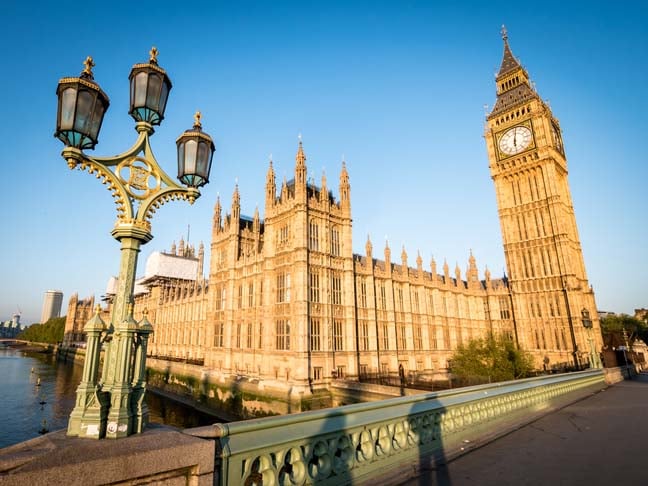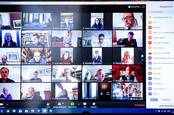Just Because We're Letting Zoom Into Parliament Doesn't Mean You Can Have Fun, House Of Commons Warns Brit MPs

Formal attire, no 'BBC Dad' episodes, and absolutely no funky backgrounds
Britain's House of Commons' embrace of "hybrid scrutiny" sessions represents the biggest change in its Parliamentary protocol in generations. But guidelines released shortly after the measure was approved show no signs of standards slipping, with members expected to dress smartly and behave with the, er, usual decorum.
At any one time, Parliament will allow 120 members to participate remotely. This is a hard limit set internally and not a consequence of any technical limitations. A Zoom representative told The Register that the Commons has an enterprise plan, which can support 500 participants concurrently.
Irrespective of whether they're present in the chamber or streaming from their kitchen table, parliamentarians will have to wear formal attire. This is a long-standing rule that's seldom relaxed, although in 2017 House Speaker John Bercow allowed male members to attend without wearing a necktie. This exception was made for one-time Sheffield Hallam MP Jared O'Mara, who struggled with the accessory due to cerebral palsy.
Members are encouraged to choose a quiet location to set up camp, where they are shrouded from extraneous noise and unlikely to be disturbed by pets and children à la BBC Dad. They should sit upright – with no slouching – at a desk or a table, and imagine themselves as posing for a passport photo.
The guidance also mentions lighting, with members told to avoid white backdrops – presumably to avoid glare. "Find a position with a plain background behind you," it stated.

Not only is Zoom's strong end-to-end encryption not actually end-to-end, its encryption isn't even that strong
READ MORE"Ideally it wouldn't be white, or a very light colour. Please exclude mirrors, doors, and bright windows… Try to avoid 'busy' backgrounds. Maps or pictures on the wall, or shelves with photos or other visual interesting items may be distracting for viewers."
The guidance also sternly warns against using novelty virtual backgrounds – a feature in Zoom that allows users to juxtapose themselves against an image, allowing them to appear as though they're dialling in from the pyramids, or hanging out on the Death Star.
It also warned members that they will potentially be seen on camera, even when they aren't actively speaking. As such, they should exercise caution and avoid holding sensitive conversations, even when on mute.
And they definitely should avoid mouthing epithets at other members – a lesson learned by erstwhile Labour leader Jeremy Corbyn in 2018, when he appeared to mutter "stupid woman" at Theresa May.
Teamwork makes the dream work
The UK has a bicameral parliament, and the House of Lords has similarly taken action to enable remote participation alongside the current social distancing measures.
The biggest difference is arguably the decision to use Microsoft Teams instead of Zoom – which has proven unpopular with some members.
Baroness Jean Coussins mentioned that despite the perceived security concerns, she finds Zoom – which is used by the Foreign Office to conduct language lessons – easier to use.
"As one of its language students, I found it very easy to participate – much easier than being on Teams. What have the security, or other, concerns been around this House using Zoom from the start when it appears to be acceptable to both the Foreign Office and the House of Commons?" she asked.
Unsurprisingly, no one mentioned the potential for Zoombombers or how to correctly address someone should they manage to crash onto the video conferencing system.
Tory peer Lord Kirkhope of Harrogate also raised an issue of usability. Demonstrating a cast-iron grasp of technical terminology, he said: "I congratulate everybody concerned with this effort to set up virtual TV for us.
"Can anything further be done to aid those Peers and Peeresses who are unable to join the virtual proceedings due to technical or broadband deficiencies in the places where they are locked down?"
This is arguably a fair point. According to the House of Lords website, the average age of its members is 70, with the oldest born in 1925. And it's not unreasonable to think that they may be living in parts of the country where Openreach vans daren't roam.
Lord McFall of Alcluith, Senior Deputy Speaker of the House of Lords, said that measures would be introduced in the second phase of the virtual sessions' rollout, but failed to mention what they would entail.
Constitutionally, we're in uncharted territory and we look forward to the familial interruptions and technical mishaps that'll bring levity to this otherwise bleak and uncertain time. ®
Sponsored: Webcast: Set up your hybrid cloud right
From Chip War To Cloud War: The Next Frontier In Global Tech Competition
The global chip war, characterized by intense competition among nations and corporations for supremacy in semiconductor ... Read more
The High Stakes Of Tech Regulation: Security Risks And Market Dynamics
The influence of tech giants in the global economy continues to grow, raising crucial questions about how to balance sec... Read more
The Tyranny Of Instagram Interiors: Why It's Time To Break Free From Algorithm-Driven Aesthetics
Instagram has become a dominant force in shaping interior design trends, offering a seemingly endless stream of inspirat... Read more
The Data Crunch In AI: Strategies For Sustainability
Exploring solutions to the imminent exhaustion of internet data for AI training.As the artificial intelligence (AI) indu... Read more
Google Abandons Four-Year Effort To Remove Cookies From Chrome Browser
After four years of dedicated effort, Google has decided to abandon its plan to remove third-party cookies from its Chro... Read more
LinkedIn Embraces AI And Gamification To Drive User Engagement And Revenue
In an effort to tackle slowing revenue growth and enhance user engagement, LinkedIn is turning to artificial intelligenc... Read more

